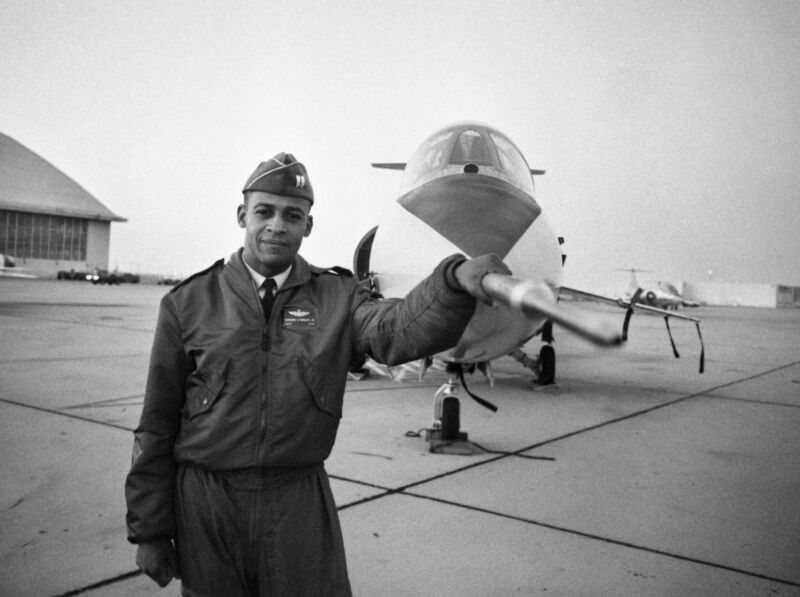
Welcome to Edition 6.38 of the Rocket Report! Ed Dwight was close to joining NASA's astronaut corps more than 60 years ago. With an aeronautical engineering degree and experience as an Air Force test pilot, Dwight met the qualifications to become an astronaut. He was one of 26 test pilots the Air Force recommended to NASA for the third class of astronauts in 1963, but he wasn't selected. Now, the man who would have become the first Black astronaut will finally get a chance to fly to space.
As always, we welcome reader submissions, and if you don't want to miss an issue, please subscribe using the box below (the form will not appear on AMP-enabled versions of the site). Each report will include information on small-, medium-, and heavy-lift rockets, as well as a quick look ahead at the next three launches on the calendar.

Ed Dwight named to Blue Origin's next human flight. Blue Origin, Jeff Bezos' space company, announced Thursday that 90-year-old Ed Dwight, who almost became the first Black astronaut in 1963, will be one of six people to fly to suborbital space on the company's next New Shepard flight. Dwight, a retired Air Force captain, piloted military fighter jets and graduated test pilot school, following a familiar career track as many of the early astronauts. He was on a short list of astronaut candidates the Air Force provided NASA, but the space agency didn't include him. It took 20 more years for the first Black American to fly to space. Dwight's ticket with Blue Origin is sponsored by Space for Humanity, a nonprofit that seeks to expand access to space for all people. Five paying passengers will join Dwight for the roughly 10-minute up-and-down flight to the edge of space over West Texas. Kudos to Space for Humanity and Blue Origin for making this happen.
Return to flight ... This mission, named NS-25, will be the first time Blue Origin flies with human passengers since August 2022. Blue Origin hasn't announced a launch date yet for NS-25. On an uncrewed launch the following month, an engine failure destroyed a New Shepard booster and grounded Blue Origin's suborbital rocket program for more than 15 months. New Shepard returned to flight December 19 on another research flight, again without anyone onboard. As the mission name suggests, this will be the 25th flight of a New Shepard rocket and the seventh flight with people. Blue Origin has a history of flying aviation pioneers and celebrities. On the first human flight with New Shepard in 2021, the passengers included company founder Jeff Bezos and famed female aviator Wally Funk. (submitted by EllPeaTea)
Revisit Astra's 2020 rocket explosion. In March 2020, as the world was under the grip of COVID, Astra blew up a rocket in remote Alaska and didn't want anyone to see it. New video published by TechCrunch shows Astra's Rocket 3 vehicle exploding on its launch pad. This was one of several setbacks that have brought the startup to its knees. The explosion, which occurred at Alaska’s Pacific Spaceport Complex, was simply reported as an “anomaly” at the time, an industry term for pretty much any issue that deviates from the expected outcome, TechCrunch reports. Satellite imagery of the launch site showed burn scars, suggesting an explosion, but the footage published this week confirms the reality of the event. This was Astra's first orbital-class rocket, and it blew up during a fueling rehearsal.
A sign of things to come ... Astra eventually flew its Rocket 3 small satellite launcher seven times, but only two of the flights actually reached orbit. This prompted Astra to abandon its Rocket 3 program and focus on developing a larger rocket, Rocket 4. But the future of this new rocket is in doubt. Astra's co-founders are taking the company private after its market value and stock price tanked, and it's not clear where the company will go from here. (submitted by Ken the Bin)

Russia's plan to “restore” its launch industry. Yuri Borisov, chief of the Russian space agency Roscosmos, has outlined a strategy for Russia to regain a dominant position in the global launch market, Ars reports. This will include the development of a partially reusable replacement for the Soyuz rocket called Amur-CNG. The country's spaceflight enterprise is also working on "ultralight" boosters that will incorporate an element of reusability. In an interview posted on the Roscosmos website, Borisov said he hopes Russia will have a "completely new fleet of space vehicles" by the 2028-2029 timeframe. Russia has previously discussed plans to develop the Amur rocket (the CNG refers to the propellant, liquified methane). The multi-engine vehicle looks somewhat similar to SpaceX's Falcon 9 rocket in that preliminary designs incorporated landing legs and grid fins to enable a powered first-stage landing.
Reason to doubt ... Russia's launch industry was a global leader a couple of decades ago when prices were cheap relative to Western rockets. But the heavy-lift Proton rocket is nearing retirement after concerns about its reliability, and the still-reliable Soyuz is now excluded from the global market after Russia's invasion of Ukraine. In the 2000s and 2010s, Russia's position in the market was supplanted by the European Ariane 5 rocket and then SpaceX's Falcon 9. Roscosmos originally announced the medium-lift Amur rocket program in 2020 for a maiden flight in 2026. Since then, the rocket has encountered a nearly year-for-year delay in its first test launch. I'll believe it when I see it. The only new, large rocket Russia has developed in nearly 40 years, the expendable Angara A5, is still launching dummy payloads on test flights a decade after its debut.
reader comments
372